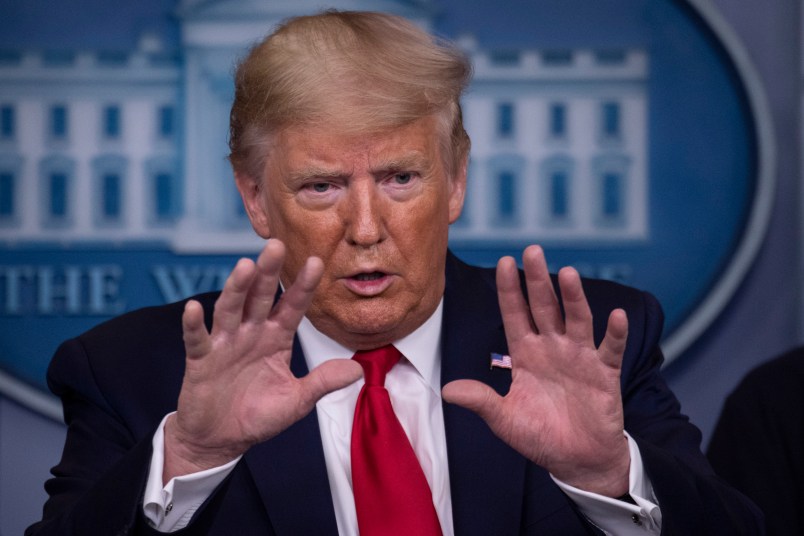When Donald Trump boosted an old anti-malaria drug on Thursday as a potential therapy for COVID-19, falsely suggesting the FDA had approved it for use, he spurred a global rush for the drug that’s having serious knock-on effects.
At a press briefing Thursday, referring to the drug hydroxychloroquine, Trump falsely said that “the nice part is, it’s been around for a long time, so we know that if things don’t go as planned, it’s not going to kill anybody.”
And on Saturday, the President tweeted that “HYDROXYCHLOROQUINE & AZITHROMYCIN, taken together, have a real chance to be one of the biggest game changers in the history of medicine.”
In fact, the drugs’ efficacy against COVID-19 is shaky at best: Chloroquine and hydrochloroquine have long been used against malaria, though the latter is a safer alternative to the former, and has for decades also been used with lupus and rheumatoid arthritis patients.
Azithromycin is an antibiotic — and while its use alongside hydroxychloroquine on COVID-19 patients has shown some very limited promise, there’s been no clinical data to suggest the duo is ready as a widespread treatment.
“What worries me is that doctors now are giving hydroxychloroquine without any information about whether or not it works,” Dr. Paul Offit, a virology and immunology expert and an attending physician in the Division of Infectious Diseases at Children’s Hospital of Philadelphia, told TPM Monday.
“That’s a dangerous, ill-informed thing to do,” he said.
Trump’s suggestion that the anti-malaria medications chloroquine and hydroxychloroquine can fight COVID-19 has led to a rush on the market. Several large drug makers have reported shortages of the medicines in recent days, according to the American Society of Health-System Pharmacists, and pharmacy boards in several states have moved in recent days to restrict the number of doses that can be given out.
“There has been a huge uptick in prescriptions of these drugs and we need to make sure that they are being used in the most appropriate way,” Ohio Gov. Mike DeWine (R) said on Twitter yesterday. “There is hoarding going on of these medications.”
DeWine authorized the state’s pharmacy board to issue an emergency rule on hydroxychloroquine and chloroquine, restricting off-label prescriptions for COVID-19 treatment to 14-day doses — and only if the virus’ presence has been confirmed by a documented positive test result.
Patients with lupus and rheumatoid arthritis face a distinct risk from the rush — a shortage of medications that they’ve used for years.
“We want to make sure that our patients have access to these medications and that they are not cut out without some thought,” Dr. David R. Karp, the president-elect of the American College of Rheumatology, told TPM Monday.
“We’re not trying to pit one American versus another here,” Karp added.
The shortage is largely fueled by consumers overseas, in Africa and South Asia, who are stocking up on the drug following Trump’s comments, The Wall Street Journal reported Monday. But doctors in the United States appear to be fueling the spike in demand as well.
Erin Fox, senior director of drug information at University of Utah Health, told Reuters on Sunday that staff in the system’s retail pharmacies had noticed doctors prescribing the drug for themselves, or for their families.
“We saw this specifically at our organization and we worked quickly to not fill those prescriptions,” Fox said.
The executive director of Texas’ pharmacy board, Allison Benz, similarly told NBC affiliate KXAN that “apparently, prescribers are writing prescriptions to stockpile the drugs for themselves/family members and their office staff as a preventative.”
“It seems like people are trying to start hoarding these medications just like they’ve been hoarding toilet paper and water,” Benz said.
The Trump-fueled hype surrounding the drugs also may be responsible for what appear to be dangerous attempts at self-medicating: On Monday, the hospital operator Banner Health said that a man had died and his wife was in critical care “after the couple, both in their 60s, ingested chloroquine phosphate, an additive commonly used at aquariums to clean fish tanks.”
“Given the uncertainty around COVID-19, we understand that people are trying to find new ways to prevent or treat this virus, but self-medicating is not the way to do so,” Dr. Daniel Brooks, medical director of Banner’s Poison and Drug Information Center medical director, said.
“We are strongly urging the medical community to not prescribe this medication to any non-hospitalized patients.”
State pharmacy boards “should prohibit the use of the drug for the treatment of COVID-19,” said Offit, the physician at Children’s Hospital of Philadelphia. “There are no data to suggest that this drug is of value. For all we know, the drug may only be harmful and not in any sense helpful.”







Unexpected?
Uh…no.
Who could have guessed that allowing the Russians to install a demented racist fuckstick as President would go so wrong?
The draining of the shallow end of the gene pool continues.
On the bright side, the more the Morans listen to Trump, the more his voting pool goes down as well.
Wouldn’t be at all surprised to learn that Disaster Donnie has a financial interest in the drugs he’s humping…
Hump & Dump Trump…
David Fahrenholdt, please contact your sources. God willing, they will have hard evidence of Trump cronies buying stock in Novartis and Bayer, who make these drugs. It’s gotta be happening.